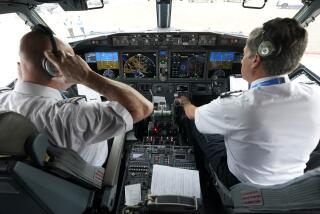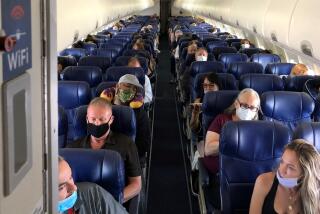Air Controllers to Get Alcohol, Drug Tests : FAA Orders Urinalyses for Personnel With Safety-Related Jobs
- Share via
WASHINGTON — The Federal Aviation Administration, concerned about “occasional incidents” of abuse of drugs and alcohol by those responsible for the nation’s air safety, Friday ordered about 15,000 air traffic controllers and other agency employees to undergo annual testing to detect use of such substances.
The new policy will apply to FAA personnel in safety-related positions who routinely have an annual physical examination as a requirement of their jobs, agency Administrator Donald D. Engen said. In addition to the air controllers, these employees include pilots for FAA planes, safety inspectors, police officers and firefighters.
Engen emphasized, however, that there has been no evidence of widespread drug or alcohol abuse within the FAA--only “occasional incidents that suggest that the agency is not totally immune from the drug and alcohol abuse problems that affect the society as a whole.”
The urinalyses will begin as soon as possible, he said. Several months ago, the FAA had recommended the tests for approval by the Transportation Department.
The FAA did not specify whether it was aware of any drug or alcohol abuse by controllers on duty, but the agency has taken action against several controllers in Reno, Nev., as well as individuals in other areas, after charges of drug and alcohol abuse were made. A week ago, the FAA announced the dismissal of three air traffic controllers in Miami after a federal investigation of allegations of cocaine and marijuana use there.
According to the FAA, the three dismissed controllers had possessed or sold marijuana at the Miami Air Traffic Control Center. Six other controllers found to have used marijuana or cocaine when off duty were reassigned and ordered to attend a six-month rehabilitation program.
‘Critical’ Positions
Friday’s action follows other government efforts to clamp down on drug abuse, such as that announced recently by the Pentagon, which has expanded its testing to include civilian employees who hold “critical” positions--such as those involving national security or nuclear weapons.
Some civil liberties experts question whether tests such as those announced by the FAA are actually broad, unwarranted searches that may violate an individual’s constitutional protections.
“We would oppose those tests, even under those circumstances (safety-related jobs),” said Norma Rollins, director of the privacy project at the New York Civil Liberties Union.
“You have no suspicion that anyone has done anything wrong,” she said. “What you are really doing is searching everyone, on the off chance that somebody may be involved in drug use or abuse.”
Furthermore, Rollins said, the accuracy of such tests has been questioned. Some tests, she said, produce misleading data because they can detect in the urine even a trace of marijuana that someone inhaled in a room where others were smoking.
She questioned also whether government employers should be in the business of monitoring behavior that does not affect job performance.
Engen defended the new policy as part of the FAA’s commitment “to do everything in our power to maintain the highest levels of aviation safety.” He said also that a positive result, showing use of a drug or alcohol, would not necessarily mean dismissal.
If a urinalysis is positive, the employee will undergo additional tests to verify whether a drug or alcohol problem exists. If such a problem is found, the employee will be relieved immediately of all safety-related functions and assigned other duties pending further action.
Employees who successfully complete a drug or alcohol treatment program could return to their original jobs but would be subject to random checks, the FAA said. A second offense would result in firing.
More to Read
Sign up for Essential California
The most important California stories and recommendations in your inbox every morning.
You may occasionally receive promotional content from the Los Angeles Times.










